How one Hawaii court case could dictate water policy nationwide

With the planet in the middle of a climate crisis, protecting water is even more urgent. The safety of water has been at the forefront of recent movements like that against the Dakota Access Pipeline at Standing Rock. Now, one Supreme Court case could jeopardize the Clean Water Act, and it shows just how legal loopholes may allow companies to continuing harming the environment without any repercussions.
Earlier this month, the Supreme Court heard arguments in the case of the County of Maui v. Hawaii Wildlife Fund. The case concerns a wastewater treatment plant in Lahaina, located in West Maui, that discharges millions of gallons of treated sewage, causing the destruction of coral reef in the Pacific Ocean.
This is where the Clean Water Act comes into play. First passed in 1972, the Clean Water Act is a federal law regulating the discharge of pollutants into surface waters, including lakes, rivers, streams, wetlands, and coastal areas.
The treatment facility in question is run by the County of Maui. When sued by the Hawaii Wildlife Fund, a wildlife conservation nonprofit, the county argued that it's not actually breaching the Clean Water Act because the sewage doesn't flow directly into the ocean. Instead, it first goes through municipal groundwater before reaching the Pacific.
In other words, there's no question that the sewage is ending up in the ocean. The county is just hoping to exercise a legal loophole to escape any accountability for that. If the Supreme Court allows that logic to fly, it could have a ripple effect.
“If the court were to adopt the position advocated by Maui County, then polluters could easily evade the act by just cutting their pipes short of the shoreline, or the river’s edge,” David Henkin, an attorney with EarthJustice who argued before the Supreme Court, told Vice's Motherboard. “This would create a huge regulatory loophole that’s never existed before.”
Coral reefs are incredibly important for the world's wellbeing. Not only are they some of the most diverse ecosystems on earth, but coral reefs also help protect shorelines and prevent erosion. However, nearly one-fifth of the world's coral has already died, and scientists predict that more than 90% of the world's coral reefs will be gone by 2050.
While many tout the economic value of coral reefs (approximately $3.4 billion, per the National Oceanic and Atmospheric Administration) as a reason to preserve them, their importance extends beyond tourism and fishing industries. It's impossible to talk about Hawaii without being honest about the detrimental impact of tourism as an industry across the islands. For native Hawaiians, coral reefs have a significance outside of dollars and cents.
"In one of Hawaii’s creation stories, the seminal organism from which all life descends happens to be the single reef polyp, ko‘a," Dave Wong wrote in Current Affairs. "From this perspective, Hawaii’s reefs are not only a giver of life — that which provides all sorts of tasty things to eat — but a familial entity within the cosmic order."
Given that the Trump administration has already rolled back other clean water regulations, it's clear that it stands on the side of the County of Maui.
But the Supreme Court is hearing a case not only about coral reefs. It is also a case about the broader legacies of colonialism and how that shapes the way the world is treated. Even with the Clean Water Act, water is still vulnerable; groundwater is largely unregulated and open to pollution. If this loophole is upheld by the court, then surface waters will be in jeopardy, too.